'They saved my life.' Middletown to lose harm reduction site with no option to reopen
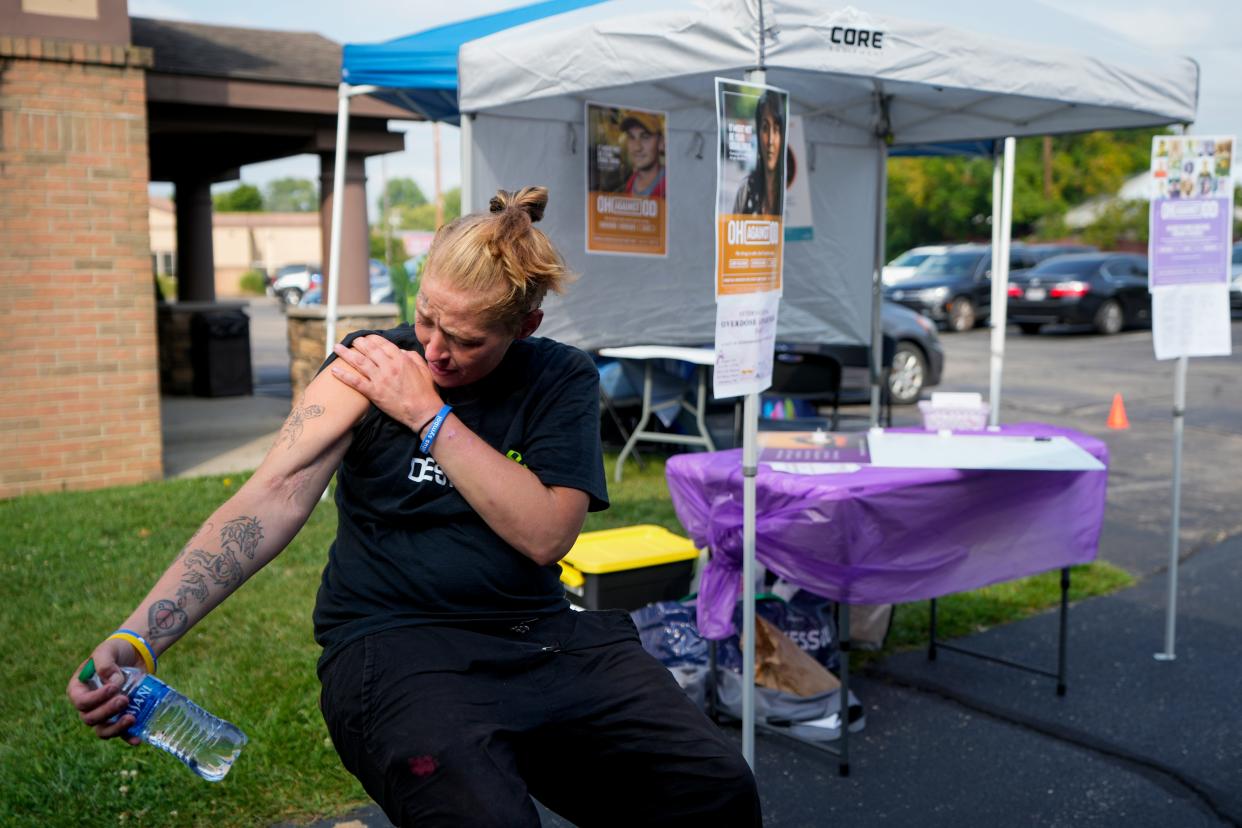
Drea Emmitt was first to arrive last week at the Middletown syringe services program: A back corner of a parking lot dotted with blue and white canopies that shielded folding tables with an array of supplies – from sterile syringes to water bottles.
“I don’t miss it,” said Emmitt, face gleaming in the sun. “It’s like church.”
Emmitt, 31, has struggled with drug use since she was 15, she said, triggered by “family problems” involving her father. She lives in Hamilton and takes the bus every week to the syringe service, where she’s been a client for a year and a half.
That weekly ritual will end in a couple of days.
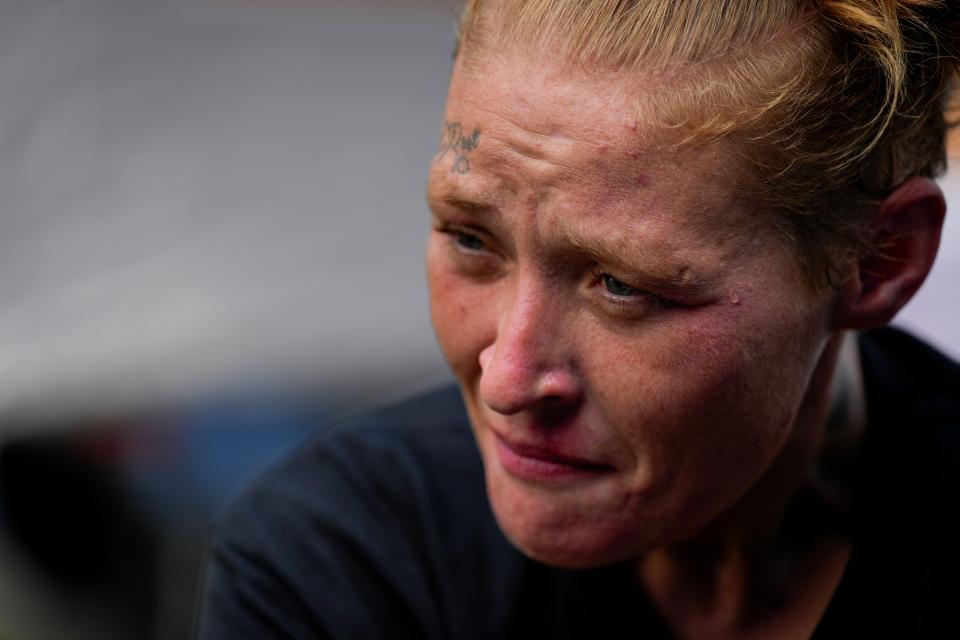
The weekly Middletown-based service, one of three that the Butler County General Health District funds, will be open from 10 a.m. to 1 p.m. Friday for the last time outside Access Counseling, a mental health clinic, in the 4400 block of South Dixie Highway.
It has no place to reopen in the city, or anywhere.
No government board and no other business in Middletown has raised a hand or given a nod to the city health commissioner’s requests to host the program on its property. And neighbors have complained about previous locations.
"I'm dreading its closing," Emmitt said.
A busy, safe space offering help for people with addiction
Middletown is by far the busiest of three Butler County safe drug-use services sites. It drew 3,380 clients and handed out more than 300,000 sterile syringes last year. The county health department safely disposed of 200,000 used syringes that clients returned to the site rather than littering the city with discarded needles.
The harm reduction program also distributed 2,613 Narcan kits and 4,555 fentanyl detection strips last year.
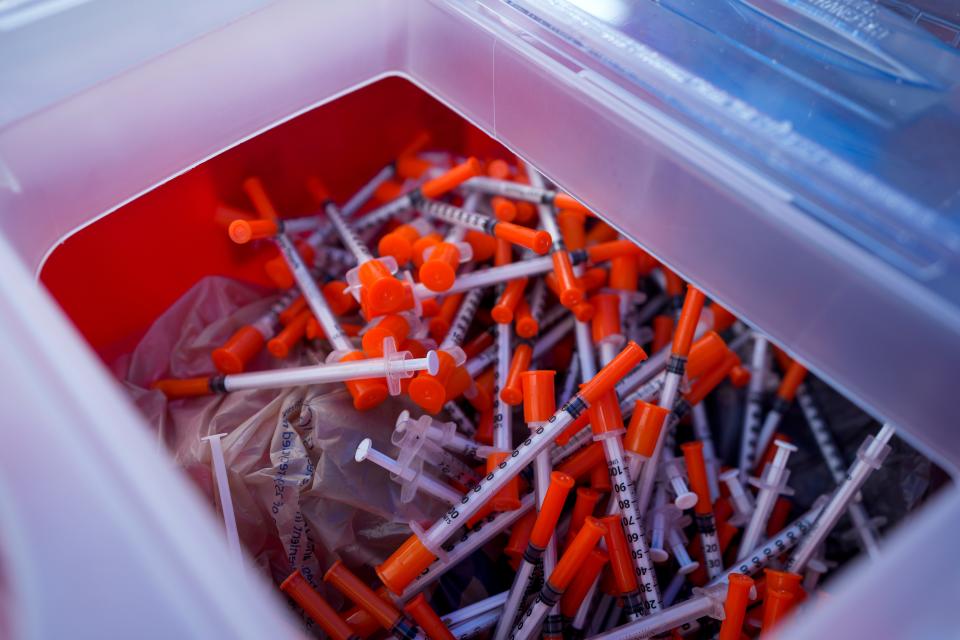
“For Narcan distribution alone, Middletown’s safe services program has been critical for the county as a whole,” said Erik Balster, health commissioner for the general health district.
For Emmitt, the Middletown program has been a safe space with warm health workers and educators as well as a place to get safe supplies.
“They’re like my family,” she said.
She started coming to the syringe exchange after she was diagnosed with HIV, and staff from Caracole, the Northside-based, regional nonprofit for HIV assistance, connected her with medical care. “I got it instantly,” she said. She takes medication for HIV every day, and the infection is no longer detectable in her blood, she said.
“They saved my life.”
Safe-use program credited with drop in HIV, hepatitis C cases, jump in overdose rescues

The people who work at the safe-use supplies site quietly worry that infections that sterile syringe services prevent will surge again in the region without the Middletown site providing evidence-based prevention supplies and care. Outbreaks of hepatitis C and HIV prompted the push for a needle exchange in the first place.
Both infection rates have dropped in Butler County since the safe syringe sites opened, records show. Balster also pointed to growing overdose reversals reported by clients who get naloxone and a drop in emergency hospitalizations for suspected overdoses in Butler County. The less-used programs in Fairfield and Oxford also contribute to the successes, he said.
This year, the program is also providing paper strips that can detect xylazine – the latest adulterant dropped into fentanyl so that people can check their supply for the drug before injecting. The test strips and wound care “have been pretty big,” said Jordan Meyer, a Butler County harm reduction worker and epidemiologist. That's because repeated injection of xylazine, an animal sedative, can cause unhealing skin abscesses.
Safe drug use program struggles with community support
The Middletown program has struggled from the start to maintain community support, advocates say.
In 2016, Butler County experienced a surge in hepatitis C cases, prompting the county to welcome the Cincinnati Exchange Project to Middletown, said Jackie Phillips Carter, the city health commissioner. The grassroots mobile needle exchange program was run from a van, led by infectious diseases expert Dr. Judith Feinberg, then a professor at the University of Cincinnati College of Medicine.
In January 2018, Hamilton County Public Health's harm reduction workers, who'd taken over the Cincinnati Exchange Program, helped Middletown's exchange.
The mobile site was moved twice since its original opening due to neighbors’ complaints and discomfort with its presence, said Phillips Carter.
It landed at Access Counseling for what was to be a temporary stay in August 2021, and later, the Butler County General Health District took over funding.
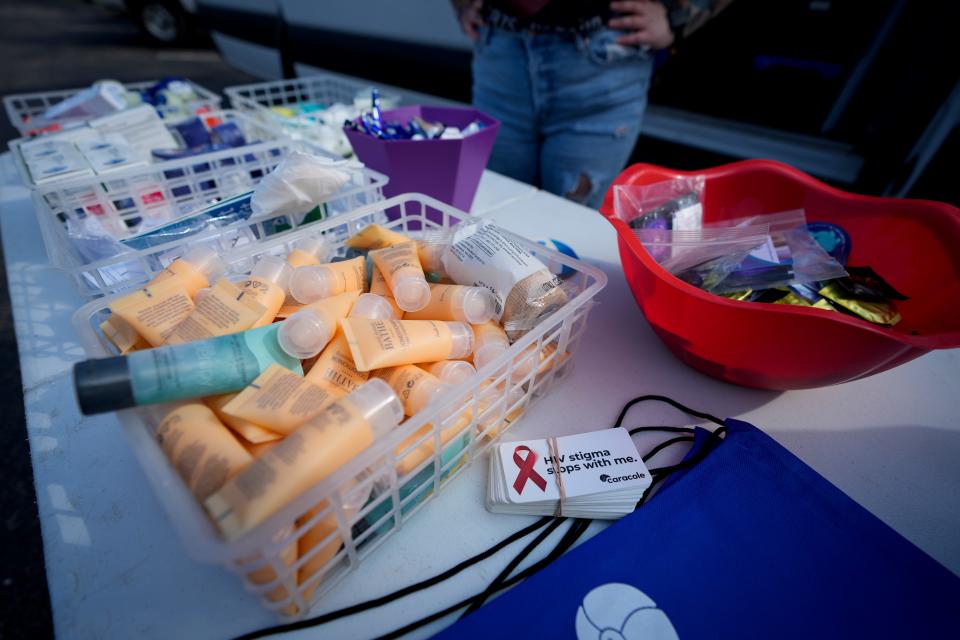
“As COVID’s gone away, the main concern is safety. The lot is small, there are cars that whip through there,” said Daryl Hams, associate executive director of Access Counseling. “We’ve got the same issue with clients who didn’t want to be scheduled at the same time as the syringe exchange.”
Hams is also project director for the Regional Harm Reduction Collaborative, a group that introduces and supports harm reduction strategies in Butler and surrounding counties. He said that despite the opioid epidemic hitting hard in the region, there remains a stigma surrounding people who have the chronic health condition, and the area needs more education.
Middletown officials expressed hope for another community to pick up the harm reduction program.
In response to Enquirer questions about the site's closure, Middletown City Manager Paul Lolli emailed a statement saying that the city is aware of the closing and “at this time” has no plans to open an alternative site.
“We feel that the future of these programs and other programs, addressing homelessness, addiction, mental health issues and others need to be better addressed on a regional basis” and, while the city acknowledges the problems, he said, “a collaborative effort would not unduly burden any single community."
"To me there are obvious greater health benefits to the program even if it’s something that no one wants in their backyard," said Middletown Mayor Nicole Condrey. She said the city has “always stepped up” to help public programs, but added, “When you continue to say yes, there’s no pressure on anyone else to host it.”
In Hamilton, Cindy Hogg, acting city health commissioner, responded to questions in an email, saying, “This has not been evaluated by our City Council in recent years. If it gets reevaluated we will let you know.”
The Hamilton city manager and his chief of staff did not respond to Enquirer requests for comment.
Balster said county data tracking overdoses and use of the syringe site show that the people who most need the services in Butler County are in Hamilton or Middletown, and a new site would be most helpful either in or around one of those cities – preferably along a bus line.
“These people are a part of the community,” he said, “and they deserve care and access to treatment.”
'These are vulnerable people'
Emmitt knows that there's no direct bus line to the Fairfield syringe-access and harm reduction site, but she is determined to get there after the Middletown program folds up for good.
“I’ll take a bus as far as I can go,” she said, “and then I’ll walk.” A bus route and Google search shows the trip from Middletown by bus would leave a roughly 2-mile walk from the bus stop that's nearest to the Fairfield site.
She brightened as George Elias stepped off the Caracole van for its visit last week.
“Hey, papa bird!” she called out from across the parking lot, smiling broadly.
“Hey, baby bird,” he replied, lifting an arm and tapping his rib cage.
It is, he said, a way to show her that he’s “got her” tucked under his wing.
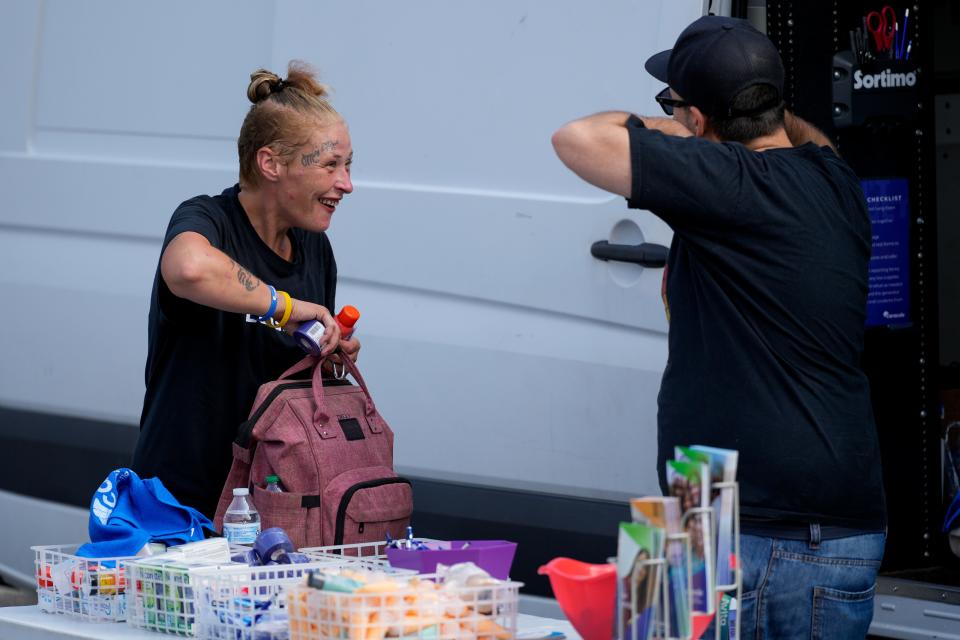
“These are vulnerable people who need these services,” said Elias, a health educator with the nonprofit.
As she made her way around the site Friday, Emmitt filled out paperwork for a Nationwide Children’s Hospital fentanyl research project and chatted with people, mostly the workers, who come from a variety of community-based health programs.
Emmitt paused at one table and took up an offer to sign a large poster that would be displayed at an International Overdose Awareness Day of remembrance a few days later at New Life Mission in Hamilton.
In red marker, Emmitt wrote, “Love you so much Nicole Emmitt.” She pulled a tiny candle from a box on the table and placed it next to her sentiment for the loved one she’d lost to overdose death.
“My wife,” she said.
Then she grasped her bag stuffed with supplies from the visit, turned and walked away.
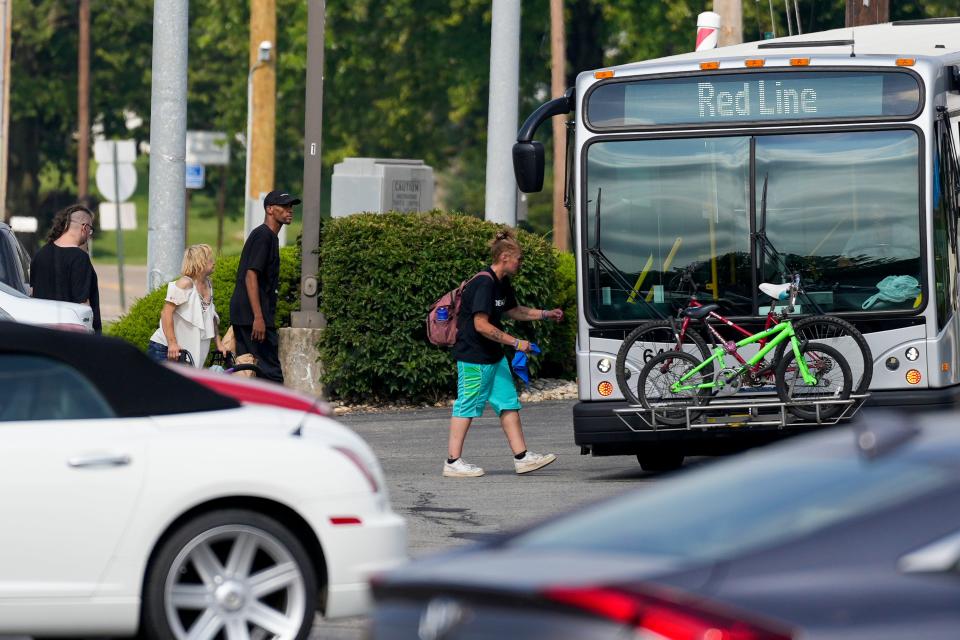
This article originally appeared on Cincinnati Enquirer: Butler County loses safe syringes, harm reduction site in Middletown

